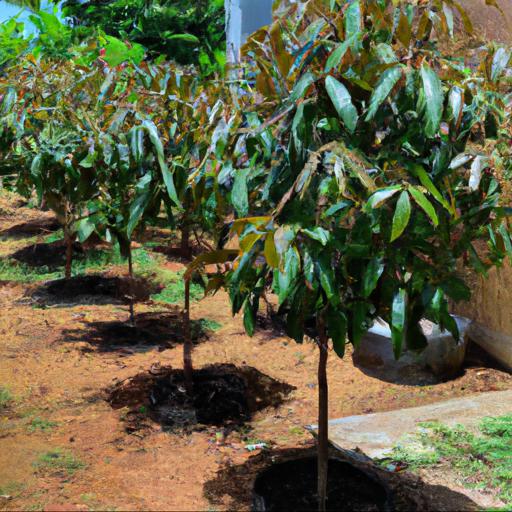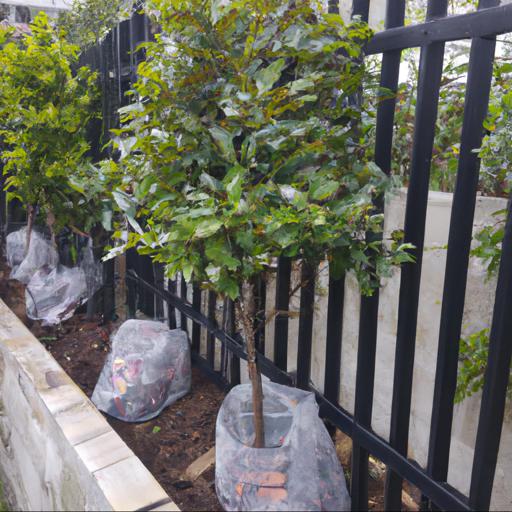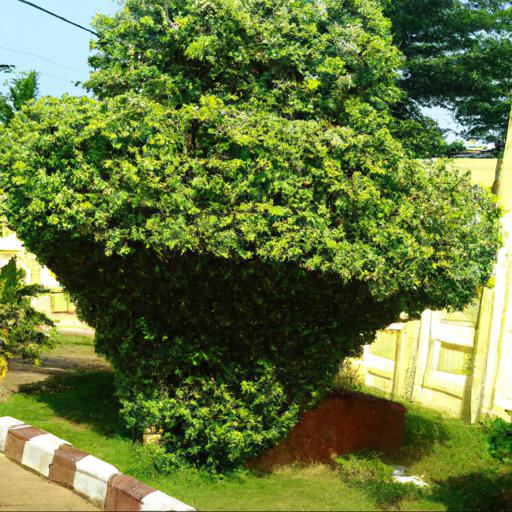Are you looking for a way to add some privacy and shade to your outdoor space? Planting trees is a great way to do just that!
But which trees are best for providing privacy? In this blog, we’ll explore the best trees for privacy and discuss the benefits they offer. From evergreens to deciduous trees, there are plenty of options to choose from.
We’ll also discuss the best ways to plant and care for these trees so that you can get the most out of them. So if you’re looking for the perfect tree to create a private oasis in your yard, read on!
Benefits of planting trees for privacy

onlyIf you are looking for a way to add some privacy to your garden then planting trees is one of the best solutions. As a UK garden expert, I highly recommend planning trees for privacy as there are several benefits to choosing this route.
For example, not only will trees help to block out prying eyes, but they can also add a great deal of charm and character to your garden space. When it comes to choosing the best trees for privacy, there are many options to consider. Depending on your budget and the amount of space available in your garden, you may wish to stick with smaller trees like hawthorn or holly which can create an effective living barrier.
Alternatively, you could opt for larger trees like evergreens or conifers which can create a thick privacy wall. Additionally, you could choose to plant a combination of different types of trees, provided space allows.
Whichever type of tree you choose, it is important to consider factors such as their mature size, any possible forms of maintenance (for example, pruning), and how long it’ll take for your chosen trees to reach their peak height. Additionally, it is useful to bear in mind that deciduous trees will not offer year-round privacy, and should be combined with evergreen species in order to maintain your much-needed privacy throughout the year. Overall, trees are a great solution when it comes to having more privacy in your garden.
With a wide range of trees available, you can create the perfect living barrier or green wall, in a way that fits within both your budget and the space available.
Types of trees for privacy

When it comes to choosing a tree for privacy, it can be a daunting task trying to decide which type of tree is best for your needs. After all, the variety of trees on the market today can be overwhelming. Whether you’re looking for a tall evergreen that provides year-round coverage or a flowering tree to add a splash of colour to the backdrop of your garden, here are some of the best options for trees for privacy.
One of the most popular trees for privacy is the Fastigiata Cedar. As a tall evergreen, the Fastigiata Cedar can provide reliable coverage throughout all seasons of the year.
Its soft foliage creates a beautiful hedge and it can also be trimmed to a desired shape. It grows best in cooler climates, and can withstand frost and snow without issue.
For those looking for flowering trees, Magnolia trees are an excellent option. Magnolias are relatively easy to maintain and boast large flowers of white and pink. Of course, they’re also great for privacy and will quickly blossom and provide coverage in any size garden.
In addition, these trees are drought and salt tolerant, making them ideal for many climates. Rhododendrons are another great choice for a flowering tree with privacy.
They tend to bloom in the spring, producing stunning, colourful flowers. They’re also fairly low-maintenance and can be easily shaped and pruned as needed. However, they’re quite sensitive to changes in their environment, so it’s important to pay attention to their soil and temperature requirements.
All of these trees make great options for privacy screening. Depending on your needs and the climate in which you live, you should be able to find a tree that will fit perfectly in your garden. With a little bit of research and attention to detail, you can easily have a beautiful and private outdoor space in no time.
How to plant trees for privacy

When it comes to privacy in backyards and gardens, there is nothing quite like foliage to create natural boundary lines and blocks. Trees are some of the best solutions to achieving this goal, as they provide a range of unique benefits and functions while enhancing the aesthetics of your outdoor space.
When choosing the best trees for privacy, there are a few key considerations to keep in mind. The most important factor to think about when selecting trees for privacy is their size and shape. If you’re looking for a tall, dense screen of foliage, you may want to opt for larger species such as the Leyland Cypress or Thuja Green Giant.
Both of these species have a fast-growth rate, reaching up to 50 foot tall, and are ideal for providing a quick and effective visual buffer. These trees are also great for blocking out unwanted noise and providing wind protection, as well as contributing to a natural chill in the air during the hot summer months. For those who prefer a more specific look and feel, there are also a variety of smaller trees to consider.
For instance, if you’re looking for an elegant ornamental tree that maintains its lush foliage throughout the year, the Kikyo Sakura is a great choice. This dwarf variety of Cherry Blossoms produces white blooms in the springtime and is known to stay small, rarely growing over 15 feet tall.
Alternatively, the Japanese Maple is often used to create a vibrant, colourful privacy screen as it offers dense year-round foliage which can be toned and manipulated to achieve a customised look. No matter what the size and shape of the desired trees for privacy, one thing is certain; when planting trees for privacy, preparation is key. Proper aeration, watering, and pest control are all essential for ensuring the health of your trees and creating a lush, full-bodied privacy screen.
With some planning and creativity, you can find the perfect tree to meet your privacy needs while also bringing an beautiful aesthetic to your outdoor space.
Maintenance tips for trees for privacy
Are you looking for the best trees to give you some extra privacy in your garden? Whether you live in an area with a lot of extra noise, or simply want to create a more private sanctuary, the right kind of trees can be the perfect solution. Considering the amount of time and effort it takes to care for a tree, it’s important to choose the right kind for your needs.
To help you make the most of your outdoor space, here are some of the best trees for privacy. The first tree to consider for privacy is the Leyland Cypress.
This evergreen tree is perfect for creating a natural screen or hedge, and can grow as tall as 30 feet with a width of 8 feet. It can also tolerate a variety of climates, so it’s a good choice for many gardens. For a smaller alternative, consider the Colorado Blue Spruce.
This tree is a hardy conifer, growing up to 15-20 feet in height and a maximum width of 5-6 feet. It’s also resistant to deer and other animals, so it’s great for adding privacy without the need for additional pest control.
Lastly, there’s the American Holly tree, which is a great choice if you’re looking to create a vibrant living fence. Reaching a height between 25 and 40 feet and a width of 15-20 feet, this tree is ideal for providing a good screen for your garden and can thrive in a variety of climates.
By taking these tips into consideration, you’ll be able to find the best trees for privacy in your own garden. Planting the right kind of trees can be a great way to add value to your home and create a more tranquil and private outdoor space.
Our video recommendation
Bottom Line
This article discussed the best trees for privacy. It highlighted a variety of trees that can provide privacy for your home and garden, including evergreens like Leyland Cypress and Thuja Green Giant, as well as deciduous trees like Red Maple and White Oak.
It also discussed the importance of considering the size, shape, and growth rate of a tree before planting. With the right tree, you can create a beautiful and private outdoor space.
FAQ
What are the most popular trees for privacy?
The most popular trees for privacy are evergreen species such as Thuja, Leyland Cypress, American Holly, and Arborvitae.
What are the benefits of planting trees for privacy?
The benefits of planting trees for privacy include increased security, improved air quality, reduced noise pollution, and increased property value. Additionally, trees can provide shade and shelter from the elements, as well as a natural barrier against wind and dust.
What are the best types of trees for creating a privacy screen?
The best types of trees for creating a privacy screen are fast-growing evergreen trees, such as Leyland Cypress, Thuja Green Giant, and Emerald Green Arborvitae.
How tall do trees need to be for providing privacy?
It depends on the species of tree, but generally trees need to be at least 8-10 feet tall to provide privacy.
How much space is needed between trees for creating a privacy screen?
It depends on the type of trees being planted, but generally a minimum of 8-10 feet of space between trees is recommended for creating a privacy screen.
What are the best planting techniques for creating a privacy screen with trees?
The best planting techniques for creating a privacy screen with trees involve planting trees in a staggered formation, spacing them evenly apart, and planting them at least 8-10 feet apart. Additionally, planting evergreen trees or trees with dense foliage will help create a more effective privacy screen.

